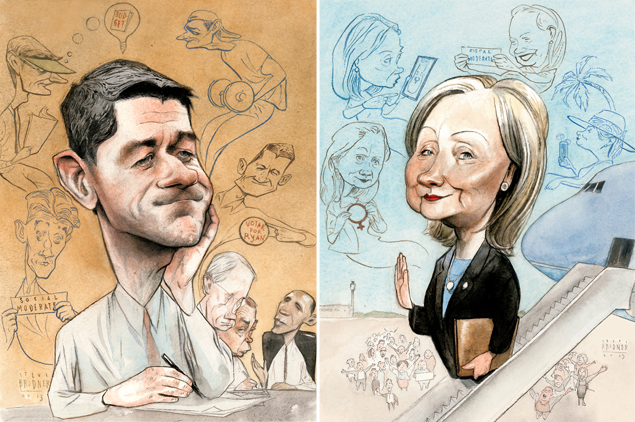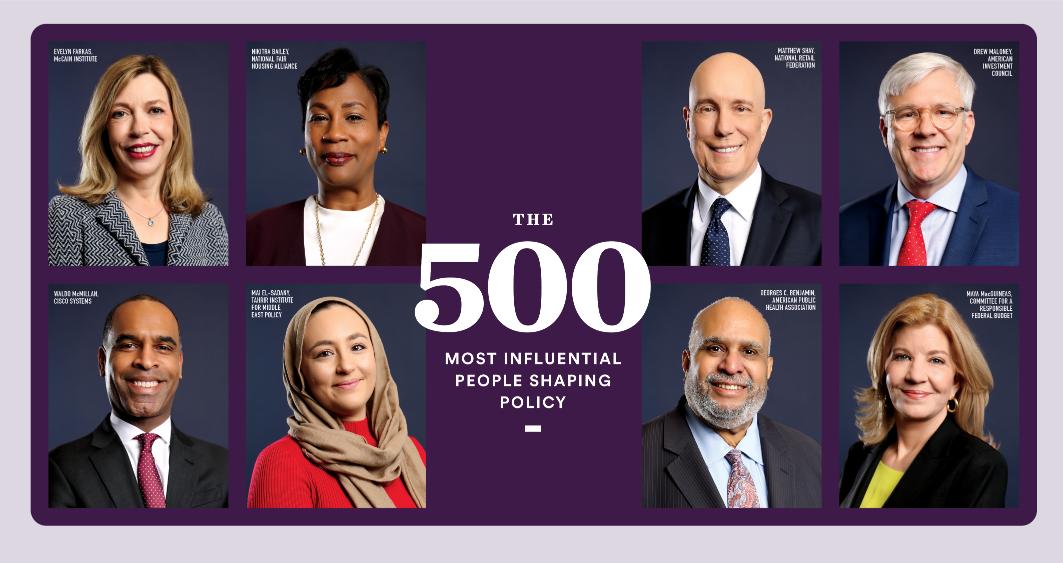Dear Paul:
You face a solid field of candidates in a party hungry to
regain the White House. So your road will be a lot tougher than
Hillary’s.
Sarah Palin is still lurking out there, but she hasn’t gained
any experience in governing since 2008 and may be a distant memory by
2016. Rick Perry may have passed Presidential Candidate 101 this time—or
maybe not. Chris Christie is an entertaining politician but too
in-your-face “Jersey” for many Republicans. Jeb Bush can’t be ignored, but
a third Bush may be more than the public can take.
Marco Rubio has the Obama thing going for him: charm,
oratorical skills, and a history-making quest to be the first Hispanic
nominee of a major party. But poor leadership skills may be a weakness.
And your fellow Wisconsinite, Governor Scott Walker, is a GOP hero for
taking on public-employee unions and surviving a recall election. That
surely would give him a boost in the GOP primary battles but could cast
him as too polarizing for a general-election campaign. Here’s what you
need to do.
1. Raise Your Profile
You were smart to run for reelection to your House seat along
with the vice-presidency. Trouble is, the House isn’t a traditional
launching pad for the Oval Office. The last sitting House member to win
the presidency was James Garfield in 1880, and he was assassinated only
months into his term. History is not on your side.
So you need to demonstrate leadership. For starters, take a
leading role in selling a budget deal to fellow Republicans to avoid the
fiscal cliff. Be bold in supporting a bipartisan solution that combines
needed spending restraint with higher taxes. You have an advantage because
you know the budget better than just about anyone else in Congress and can
argue that the tax increases are a fair price to pay to win savings in
entitlement programs and to reduce our burgeoning national debt. If you
can help sell a deal, you’ll be an instant hero with the public, the
business community, and the media. True, many Republicans will be irate
over any deal that includes higher taxes, but you can argue that the GOP
won more than it gave up. The pundits likely will deem you a top contender
for the GOP nomination.
2. Play Down Social Issues
The 2012 election proved again that the economy trumps social
issues with the majority of voters, and being too far right on the social
agenda can hurt in the general election. Ask Senate candidates Todd Akin
and Richard Mourdock, whose controversial comments on rape cost them
election in Missouri and Indiana. Follow Ronald Reagan’s lead: He kept the
social agenda on the back burner and won two blowout races by making the
economy, leadership, patriotism, and national security the hallmarks of
his candidacy.
Unlike Mitt Romney, who was all over the place on social
issues, you’ve been a consistent social conservative. Republicans know
where you stand. You don’t need to dwell on your positions.
3. Court the Latino Vote
Romney’s loss can be attributed in large measure to his failure
to appeal to Latinos, who helped give Obama the keys to the White House
again in states such as Nevada and Colorado. George W. Bush won two terms
in part by taking a more centrist position on immigration reform. That
should be your path, too. Don’t vacillate as Romney did.
If Rubio, with his roots, and Jeb Bush, with a more moderate
record on illegal immigration, enter the 2016 race, they may pull the GOP
closer toward the center on immigration so the party stops losing the
fastest-growing demographic in the country. The imperative to be
competitive with this key voting bloc will be even greater a few years
from now.
4. Embrace the “X” Factor
Play up your youth. At age 42, you’re the first post-baby
boomer to be on a presidential ticket. As a Gen-Xer, you can speak for all
those millions of voters who are weary of the boomer horde and the soaring
costs they’re imposing on the nation as they enroll in Medicare and
collect Social Security.
Your generation and those that follow want to know how their
elected leaders will keep entitlement costs from getting out of hand.
Their top priorities are jobs, housing, and education, not retirement.
Your proposal to reform Medicare by offering an alternative
option—vouchers to buy private insurance—may be anathema to seniors but
could speak to younger voters.
John F. Kennedy’s 1960 run for President marked the passing of
the torch to a new generation. After 24 years of boomer Presidents
(Clinton, Bush, Obama), you can be in the vanguard of another historic
transition.
Dear Hillary:
The Democratic nomination is yours if you play it smart and
outfox your toughest primary challengers—Joe Biden, Andrew Cuomo, Deval
Patrick, Martin O’Malley, and Mark Warner. Here’s what you need to
do.
1. Take a Long Vacation
After four years as Secretary of State, you need a break to
revive yourself and build up the stamina needed for a grueling
presidential campaign. After an exhausting period of globetrotting, lots
of R&R is essential. You don’t have to stay in the public eye. Your
name recognition is 100 percent, your public-approval rating is the
highest of any member of Obama’s Cabinet, and your record at State is
stellar but for the controversy over the assault on the US consulate in
Benghazi that led to the death of Ambassador Chris Stevens. Tragic as that
event was, it’s hard to see it as a political liability in four
years.
You’ll turn 69 in 2016, the same age Ronald Reagan was in 1980
and younger than GOP nominees Bob Dole and John McCain when they ran. And
“Uncle” Joe Biden will be 73. So your age is hardly a disqualifying
factor.
Demur on your plans for running for President until 2014 to
keep your opponents off balance, and spend time quietly collecting
political chits. You don’t need to devote a lot of time building an
organization and raising money. Your 2008 operation will come back
together quickly, and a torrent of money will flow your way the moment you
announce.
Just as the “new” Nixon came out from years of hiding to win in
1968, you can emerge from your hiatus in 2014 or 2015 as the new Hillary:
tanned, rested, and ready.
2. Keep Bill in Check
Your husband is as charismatic and popular as ever. President
Obama’s victory was aided in no small part by the former President’s
powerful speech at the Charlotte convention and his energetic campaigning
through Election Day. But Americans also expect their political icons to
behave. Though the Monica Lewinsky episode seems like ancient history, no
one wants to see another embarrassing family feud unfold in public. Assign
a full-time minder to him.
3. Embrace the “Third Way”
When the election cycle begins, campaign as the candidate of
compromise and consensus. That’s a lesson you can borrow from Bill, whose
centrist positioning and bipartisan deals were hallmarks of his
presidency.
Even as our two parties have moved further to the left and
right, Americans yearn for problem-solving leaders. Grab the center from
the start and never budge. You don’t have to prove your liberal bona fides
to Democrats. Run as the candidate who really can break the gridlock with
common-sense solutions and bipartisan goodwill. Just as Bill worked with
Republicans to reform welfare and pass NAFTA and Cold Warrior Richard
Nixon opened the door to China, you can be the candidate willing to tackle
the third rail of Democratic politics: unsustainable entitlement
spending.
4. Play the Gender Card
Your bid to become the first woman nominated for President by a
major US party fell short in part because of Obama’s equally historic
status in 2008. Your time has finally come—don’t hesitate to make your
campaign one of destiny. No doubt others will campaign to be the first
Hispanic presidential nominee (Marco Rubio, Julian Castro?) or the first
Indian-American (Bobby Jindal, Nikki Haley?). But you have the numbers on
your side—more than half the electorate. Perhaps Sarah Palin will try to
be the Republican nominee. All the better to turn 2016 into the year the
United States finally elects a woman President.
Your campaign can become a cause as deep and passionate as
Obama’s stirring run in 2008.
Nicholas Owen covers Washington’s political scene. Subjects of previous Washingtonian articles include Federal Reserve chairman Ben Bernanke, President George W. Bush, and Congress.
This article appears in the January 2013 issue of Washingtonian.

















